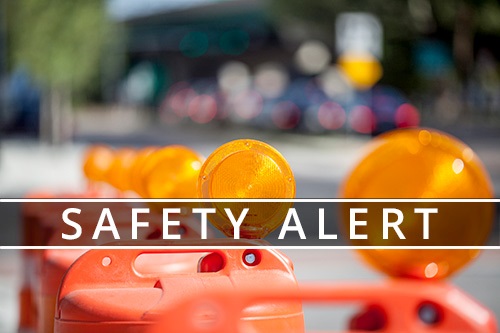February 28, 2024
Roadway departures and cardiac arrests

As a service to our policyholders, Texas Mutual shares serious workplace injury trends based on catastrophic injuries and fatalities reported to our claims department. Not all of these reported injuries are covered by workers’ compensation, but our goal is to help you ensure these types of incidents do not happen in your workplace. Find safety tips below to help keep your employees safe on the job.
If you have questions, we encourage you to contact our safety services support center at 844-WORKSAFE (967-5723) or safety@texasmutual.com.
In this alert:
- Roadway departures
- Cardiac arrests
Roadway departures
An employee was driving from a job site when their truck rolled off the highway and struck a fence. This collision caused equipment in the truck to strike the employee in the head. In a separate incident, an employee’s vehicle slid and then rolled into a ditch, ejecting the employee through the window. Unfortunately, both employees lost their lives as a result of their injuries.
From 2016 to 2018, 51% of all traffic fatalities resulted from roadway departures, according to the U.S. Department of Transportation. Although there are many reasons why a vehicle might leave the roadway, there are also many steps drivers can take to help keep their cars on the right path.
- Ensure you are well-rested before driving.
- While driving, concentrate on the environment around you, including pavement markings, road signs and other vehicles.
- Keep your hands on the wheel at all times.
- Follow posted speed limits and slow down according to weather and traffic conditions.
- Avoid using any electronics while driving, including your phone and navigation system.
Cardiac arrests
An employee suffered cardiac arrest after having fought a structure fire at work earlier that day. In another incident, an employee was driving to a job site and pulled over at the request of a passenger who noticed the employee looked very pale. After doing so, the employee stepped out of the vehicle and collapsed due to cardiac arrest.
The Occupational Health and Safety Administration (OSHA) estimates about 10,000 cardiac arrests occur in the workplace per year. If a coworker is breathing abnormally or suddenly loses responsiveness, even when tapped hard on the shoulder or asked loudly if they are okay, they may be experiencing cardiac arrest. Prompt response is crucial, and, as always, you should follow your company’s emergency response plan for specific details.
- Before any event occurs, locate the automated external defibrillator (AED) in the building or at the job site, if available.
- If someone appears to be suffering cardiac arrest, check the employee for responsiveness and breathing.
- Shout for help to locate an employee who is trained in first aid (if you’re not), call 911 and have someone get the nearest AED.
- When the AED arrives, someone trained in first aid should turn it on and follow the instructions.
- If the employee is not breathing or only gasping, a trained responder should perform CPR until the person begins breathing or moving or until emergency personnel arrive.
Get free safety resources
Texas Mutual policyholders have access to thousands of free training materials in our multimedia safety resource center, including our safety catalog with up-to-date resources.
To access the free materials, log in to your texasmutual.com account and select Safety. If you need help accessing the safety resource center or you have a workplace safety question, call us toll-free at 844-WORKSAFE (967-5723).
Download a PDF (164KB) version of the February Safety Alert.